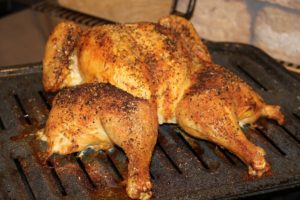“Big Jim!” Dave called as he bounded down the steps to the patio in back. He held up a brown paper grocery bag. “I brought the chicken.”
“So good to see you,” Jim said, shaking Dave’s hand. “It’s been a few years. Last time I saw you was in New York, after we were back in the states. You’ve put on a few pounds.” He waved Dave into a lawn chair and pointed to a young man: “This is my nephew, Billy.”
Billy was sitting on the back steps, a trimmer version of Jim. The same brown hair that laid flat, and he was probably as tall.
Dave peered around the neighborhood to orient himself. The Coca Cola building was next door, and a steep hillside was behind. The traffic noise from Biltmore Avenue was muted. The wind whispered through pear trees lining the street below.
Jim was lighting a fire in the grill. “I was telling Billy about that chicken in Germany.” He grinned and continued with the story, “We were fighting the Germans in Answat. We were driving back to camp when a German chicken ran right under our jeep. Killed it. We weren’t in a hurry just then, so we stopped and picked it up.”
“Answat? Where’s that? I don’t remember Answat.” Dave unwrapped the chicken on the picnic table. He spotted the metal cooler with beer on ice. There was a can opener on the table beside it. He reached for it and gestured toward the cooler, asking permission.
“Maybe it was Bawinkle. I don’t know. Apendorfen!”
“Clucksberg!”
Jim gave Billy a whimsical look and continued, “The sergeant pointed toward the mess tent when we showed it to him. Wasn’t nohow we could cook it by ourselves. I’d never killed a chicken before, much less cleaned and cooked it. City boy Dave, here, wasn’t no help either.”
“Only chicken I’d ever seen was fried,” Dave said. “The head cook laughed at us and hollered loud across the kitchen, ‘Satch, get over here. Show these boys how to live on roadkill.’”
Jim handed Dave a cold can of beer. “Satch was country, I mean real backwoods, poke-salad poor. He didn’t have any feelings about what he killed and ate. But he was a good cook, there in the army, considering what they had to work with. He had people foraging for herbs and bringing back basil, garlic, eggs, all kinds of stuff. Army doesn’t care what food tastes like, but they fed us. They kept fuel in the trucks too, the same way. Didn’t need to be high test, just had to run the trucks. So Satch would spice it up for us. He was good.”

Dave laughed again. “He cleaned it and cut the backbone out of that chicken, then smashed it flat out. He called it ‘spatching’ the chicken. Then he put spices on it and grilled it. He had about a hundred other chickens going that way. They must have found a chicken farm nearby. We might’ve bagged one that got away. Satch poked a stick in it with a basil leaf on it like a flag. ‘This one’s yours,’ he said.”
“I heard later that’s called ‘spatchcocking.’” Jim had Dave’s chicken on a cutting board. Its backbone was out, and he was flattening it for the grill. “You think Satch was named after spatching or spatching was named after Satch? We called him Spatch after that, whenever we saw him. He’d grin real big and cock his finger at us. I heard after the war he was cooking in New York City and hoping to open his own restaurant.”
“You remember his go’slow pie?
Billy asked, “What’s that?”
Dave shrugged and said, “I don’t know. He’d talk about it like it was a dream. Said he’d make one for us, but he never did.”
“He said we’d never be able to eat army food again after tasting his go’slow pie. We’d be spoiled.” Jim shook his head. “We’d be jinxed then, if we ate his pie. We’d get killed for sure, ‘cause we’d already be halfway to heaven. We’d be so happy we’d walk into a crossfire of bullets and never care.”
He added, “It was brutal, those days, so we took what humor we could get. Guys took care of each other, laughed at the bad jokes, made jokes about the bad jokes.”
The chicken was on the grill with lemon, olive oil, and spices on it. Dave smelled it, then sipped his beer. He half-whispered, “Satch used to say, ‘Don’t be in a hurry to get to heaven.’”
“Sergeant used to say, ‘Fight to stay together, fight to stay alive.’”
“He was right. I learned a lot over there.”
The chicken browned over the fire, slow cooking.
______________________________________________________________
This is a work of fiction by John Senechal
Photo credit: https://www.thehealthnutmama.com/roasted-spatchcock-chicken/
